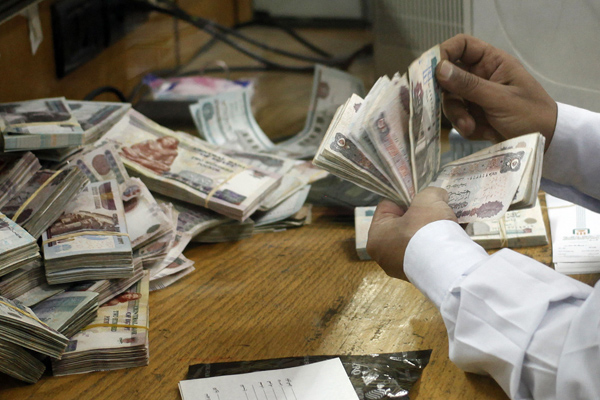by Maye Kabil: With the objective of reducing imports and enhancing investments and exports, the Central Bank of Egypt (CBE) allowed the local currency, the EGP, to lose 2.6 per cent of its value against the dollar earlier this month.
This step is always accompanied by a debate regarding the benefits and sustainability of the balances it may create. Some investors consider this a good step to boost exports, claiming that the pound is much higher than its fair value. Other economists focus on the fact that Egypt is a net importer of food and many basic goods, which makes the devaluation trigger inflation, which negatively affects poorer citizens the most.
For five months, the pound was held at 7.53 against the dollar (interbank rate) until earlier this month, when CBE allowed it to weaken to 7.63 and further to reach 7.73.
According to CBE regulations, commercial banks are allowed to trade dollars to 10 piasters above or below the official rate, and an extra 5 piasters for currency exchange bureaus. So the market price for the dollar after the latest devaluation is 7.83 pounds at the banks, and around 7.88 in exchange bureaus.
CBE Governor Hisham Ramez explained in a phone call to a television programme that this step helps contain an expected increase in imports. He said the difficult conditions in Greece will make the upcoming period tough for Europe, and commodity prices are expected to decrease. This will vigorously increase import operations and affect production in Egypt, according to Ramez.
The devaluation was expected because Egypt is an economy that’s running successive deficits in its balance of payments, which is only likely to widen in light of accelerating investment growth and weak tourism revenues, according to analysis by investment bank EFG Hermes .
Egypt’s total imports reached $56 billion in 2013/2014, while its exports did not exceed $26 billion. Meanwhile, tourism revenues that used to help fill part of the gap of foreign currency resources, has dropped since 2011.
Although the target of reducing imports could be helpful in narrowing the deficit of foreign balances, the fact that a high percentage of imports is essential goods and production components makes it hard to be accomplished. A weaker pound will raise the cost of imports which will be reflected in higher consumer prices. However, it may help eliminate unnecessary imports.
On the other hand, many voices say that a weaker pound is empowering Egyptian exports. Jason Tuvey, an economist at London-based Capital Economics, told Bloomberg that the EGP needs to weaken by at least another 5 per cent to restore Egypt’s competitiveness.
But although the pound depreciated around 20 per cent since 2011, exports deteriorated around 10 per cent during the past 4 years, according to Omar Al-Shenety, executive director of Multiples Group, a financial and investment advisory. This indicates that boosting exports needs a comprehensive policy which does not solely depend on the currency value.
Other aspects considered in this regard include the quality of the products, marketing facilities, financial facilities, transport and many other factors.
The regulations put in action a few months ago by CBE helped to eliminate the black market of currency, although it also added an obstacle to importers and producers.
The bank also imposed a $10,000 daily ceiling for cash deposits in hard currency for both individuals and companies, with a total monthly limit of $50,000. This helped to reduce black market dealings, but at the same time made it harder for investors to find the needed dollars to finance their deals overseas. This includes production components needed to be imported to make production possible.
EFG Hermes is expecting the dollar to reach 8 pounds in the near future. However, its reports indicate that EFG does not consider this enough to attract investors.
“A devaluation is only successful if it attracts capital: A new devaluation round is initially positive for investor confidence as it hints towards the EGP coming closer to its real value. However, regained confidence greatly depends on the extent of devaluation the CBE is ready to instate in the system. If we settle with a minor devaluation of 3-5 per cent, then we are not likely to see the rewards.”
Hence the investment bank is expected to continue to experience FX shortages in what would be a repetition of the scenario of the 1H2015. This is more so in light of an expected setback to the tourism sector in light of domestic and regional escalation of violence, accelerating import growth as Egypt imports more energy and the investment cycle kicks off. However, a more aggressive devaluation, in the range of 7-10 per cent, would definitely increase the chances for attracting capital inflows, though it would also increase the risk of igniting high inflationary pressures.
On the other hand, inflationary pressures are clearly set to rise over the coming few months, driven by the devaluation of the pound that affects the prices of all imported goods. In addition, the government is planning to apply the value added taxes VAT in few months, as announced in the state budget. Inflation was running at a five year-high of 13.1 per cent Y-o-Y in May and is likely to remain within the 11-13 per cent range in the next 12-18 months as investment banks expect.


